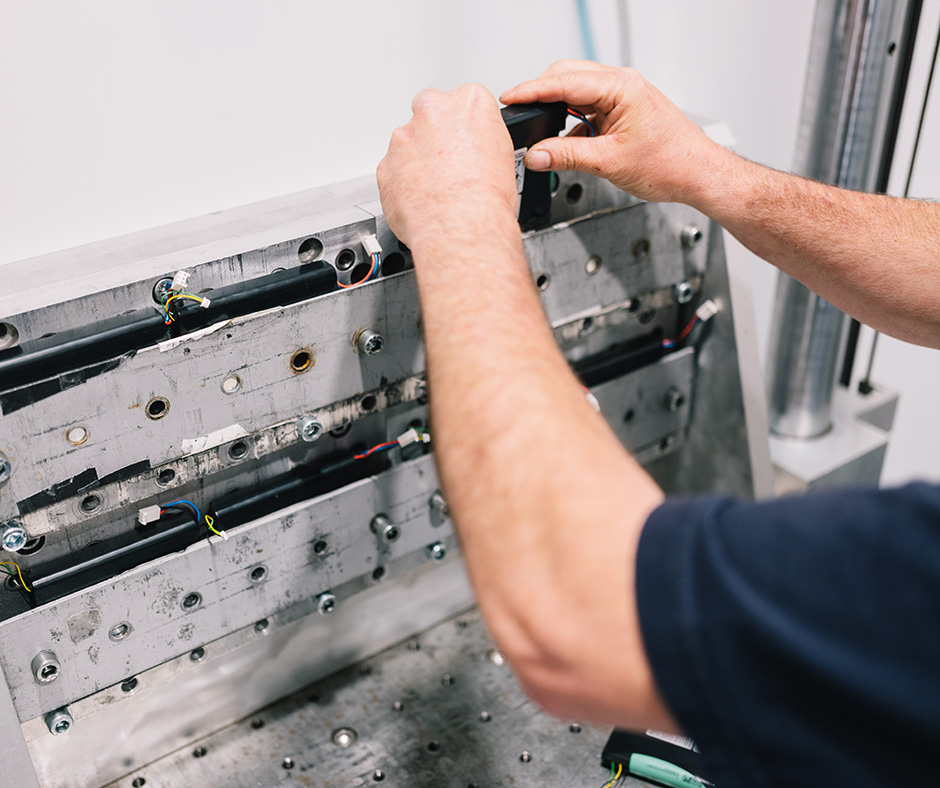UL 1973

IMPORTANT IN BRIEF
UL 1973
The UL 1973 standard is a key safety standard for rechargeable batteries used in stationary energy storage systems (e.g. in data centres, wind turbines or UPS systems), as auxiliary power sources in vehicles (e.g. for lighting or equipment) and in light electric rail (LER) vehicles. It defines clear requirements for design, manufacture and testing to ensure operational safety and minimise risks such as overheating, short circuits or mechanical failure in accordance with the standard. Thanks to its international recognition, UL 1973 facilitates market access and ensures uniform safety standards in the industry.
As an independent testing laboratory, we offer comprehensive testing for certification according to UL 1973. Our tests cover all safety-related aspects, including electrical stress tests, mechanical stability tests, vibration tests, and thermal and fire safety tests. Among other things, we check whether battery systems can withstand extreme temperatures, resist shocks and vibrations, and have effective protection mechanisms against overcharging or deep discharge. Our tests play a particularly important role in the area of fire safety, as they ensure that batteries do not pose any additional hazards even in the event of thermal runaway.

What makes us the ideal partner for your UL 1973 certification
Accredited testing laboratory
As an independent and accredited testing laboratory, we offer comprehensive testing and certification services in accordance with UL 1973. Our testing procedures ensure that your stationary energy storage systems and batteries for vehicle auxiliary power supplies and light electric rail (LER) vehicles meet all safety-related requirements.
Many years of experience
We have specialised in testing and certifying battery systems for over 15 years. With in-depth expertise and extensive experience in the energy storage industry, we ensure that your products meet all UL 1973 requirements and receive smooth market approval.
Complete test coverage
We carry out all tests required by the UL 1973 standard in our modern laboratory. These include mechanical stress tests, thermal stability tests, electrical safety analyses and extensive fire and short-circuit tests. Thanks to our comprehensive testing capabilities, we can identify and minimise potential risks at an early stage.
Rapid market launch
Thanks to our structured and optimised testing procedures, you receive fast and accurate test results. Our efficient certification process helps you avoid delays and bring your products to market quickly.
Pioneering laboratory technologies
Our testing laboratory has state-of-the-art testing facilities that enable detailed analysis of battery systems. From mechanical stress tests and high-voltage tests to environmental tests, including temperature change tests and vibration tests, we test your products under realistic conditions and ensure maximum safety and compliance with standards.
Specific test procedures
Energy storage systems and batteries are subject to specific requirements depending on their application. We offer tailor-made test solutions for stationary battery storage systems, vehicle batteries and rail vehicle batteries that precisely meet the specifications of the standard.

The role of UL 1973 in the safety of modern battery systems
Battery systems play an essential role in energy storage, particularly in stationary applications, vehicle auxiliary power supplies and light rail vehicles. As these systems are exposed to high loads, they must meet strict safety standards. UL 1973 is a key standard that ensures rechargeable battery systems function reliably and safely and are suitable for a variety of applications. It defines clear requirements for the mechanical, thermal and electrical safety of energy storage devices to minimise risks such as short circuits, overcharging or thermal runaway.
Manufacturers, operators and system integrators benefit from certification, as it not only increases product safety but also facilitates access to international markets. As an accredited testing laboratory, we conduct comprehensive tests in accordance with UL 1973 and ensure that battery systems pass all required safety tests.
The path to successful UL 1973 certification
In order for a battery system to obtain UL 1973 certification, it must undergo various testing steps. At the beginning of the process, our experts analyse the technical specifications of the battery to determine which tests are required. This is followed by a comprehensive safety test in our laboratory, during which the battery is subjected to mechanical, electrical and thermal stress tests. These tests simulate real-life operating conditions, including temperature change tests, and help to identify potential weak points at an early stage.
Special attention is paid to thermal and fire safety tests, which ensure that the battery does not self-ignite or pose other safety-critical risks in the event of a malfunction. In addition, electrical protection mechanisms are checked to ensure that overcharging or short circuits do not cause a dangerous incident. After completing the series of tests, we create detailed documentation of the results, which is required for official certification according to UL 1973. After completing the series of tests, we create detailed documentation of the results, which is required for official certification according to the UL 1973 standard.
FREQUENTLY ASKED QUESTIONS & ANSWERS
UL 1973 is a safety standard for rechargeable battery systems used in stationary energy storage systems, vehicle auxiliary power supplies and light rail vehicles. It specifies requirements for mechanical, thermal and electrical safety in order to minimise risks such as overcharging, short circuits or thermal runaway. Through standardised test procedures, it ensures the safety and reliability of these battery systems in real-world operation.
UL 1973 focuses on safety requirements for stationary energy storage systems and battery systems in specific vehicle applications, while IEC 62133-2 is geared towards portable, gas-tight secondary cells with alkaline or non-acidic electrolytes. UL 1973 places greater emphasis on mechanical strength, thermal stability and fire protection in large-format battery systems, while IEC 62133-2 focuses primarily on electrical safety testing for smaller, portable battery packs.
The UL 1973 standard comprises a series of mechanical, electrical and thermal tests to ensure the safety and performance of battery systems. These include short-circuit tests, overcharge tests and deep discharge tests, as well as mechanical stress tests such as vibrations, drops and shocks. In addition, there are fire safety tests, including fire exposure tests, to assess the battery's resistance in the event of thermal runaway.
UL 1973 is technology-neutral and not limited to a specific battery technology, but applies to various systems and applications. It applies to various battery systems, including lithium-ion batteries and other cell chemistries used in stationary energy storage systems, vehicle auxiliary power supplies and light rail vehicles. However, the competitor analyses did not provide detailed information on specific battery types.
UL 1973 certification ensures that battery systems meet the highest safety standards and minimises potential risks. It increases the confidence of customers and business partners, facilitates international market access and contributes to compliance with regulatory requirements. It also protects manufacturers from liability risks that could arise from unsafe products.
As an accredited testing laboratory, we have state-of-the-art testing facilities and years of experience in battery testing. We offer all testing procedures for UL 1973 certification from a single source and ensure efficient, standard-compliant processing. Thanks to precise testing methods, individual testing approaches and fast processing times, we support manufacturers in bringing their battery systems to market safely and successfully.
INFORMATION ABOUT THE AUTHOR
Alexander Roth
Alexander Roth is head of the test laboratory at Batteryuniversity and an expert in the testing and certification of lithium-ion batteries.







